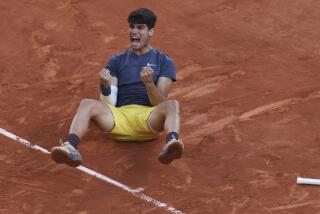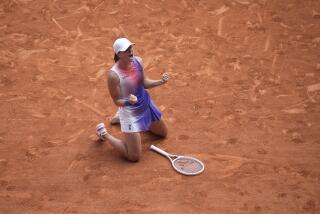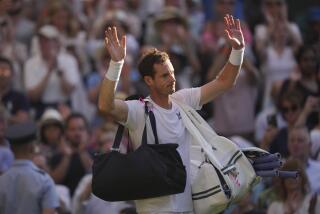FRENCH OPEN : Chang, Edberg Among Losers : Tennis: Stich also falls during day of upsets in Paris. Korda is the lone winner among seeded players.
- Share via
PARIS — Upon hearing the results of the bottom half of the men’s bracket Saturday at the French Open, Michael Chang declared, “It’s an open draw.”
But Chang, seeded fifth and playing superb tennis, will not be around to take advantage. Neither will second-seeded Stefan Edberg, nor fourth-seeded Michael Stich of Germany, the defending Wimbledon champion.
Only Petr Korda of Czechoslovakia survived among those seeded players competing Saturday at Roland Garros Stadium, where some of the tournament’s best players were sent packing in the third round. Korda is seeded seventh.
Chang staved off eight match points before No. 94 Nicklas Kulti of Stockholm won dramatically, 7-6 (7-5), 2-6, 6-3, 3-6, 8-6, in the late evening light on Court 1.
Edberg could not overcome the pinpoint shots of No. 34 Andrei Cherkasov of Russia, and an untimely official’s ruling, losing, 6-4, 6-3, 7-6. Edberg had reached the final of his last two Grand Slam events, winning the 1991 U.S. Open and losing to Jim Courier in the final of the Australian Open in January.
Stich tried to overcome 1991 French Davis Cup hero Henri Leconte and a partisan Center Court crowd in a 7-6, 6-4, 6-4 loss.
Two other seeded players, No. 12 Richard Krajicek of the Netherlands and No. 13 Aaron Krickstein of Grosse Point, Mich., were eliminated by Uruguayans. Krajicek lost to qualifier Diego Perez in straight sets, and Krickstein was down a set to Marcelo Filippini when he retired because of a blister on his right foot.
The bracket might read like a Book of Who’s That, but if the Kulties of the world continue their assault, they might enter a new dimension. In each of the major upsets Saturday, the favorite was overwhelmed by outstanding play.
Gracious as usual, Edberg emphasized Cherkasov’s talent, although he might have mentioned the timing of an official’s call in a third set tiebreaker was disruptive. The call sent the crowd into an uproar that lasted almost 90 seconds.
Trailing 5-3, and down to his final points, Edberg was unable to reach a serve by Cherkasov that nicked the backhand service line. The lines official called it out, but Cherkasov, a dangerous clay-court player, questioned the call. He then appealed to the referee, who overruled the linesman and gave Cherkasov the point.
Edberg asked the crowd to quiet twice before serving on triple match point. He sent a sizzling shot to Cherkasov’s backhand that was not returned. But after missing his first serve on the next point, Edberg could not counter Cherkasov’s groundstrokes and lost the match.
Cherkaskov said the official made the right decision on the service call.
Edberg refused to criticize the call but admitted he was disappointed.
“You feel like you want to sink through the ground,” he said. “(But) what can you do?”
Edberg said the situation reminded him of the 1991 French Open when a call went against him in his quarterfinal match against Jim Courier. The difference, however, was he survived that match.
Cherkasov said he played one of his best matches.
“I played with nothing to lose today because he is No. 2,” Cherkasov said.
Kulti, who turned pro in 1989, the year Chang won the French Open at age 17, offered much the same sentiment. The 22-year-old Swede played with ease.
For Chang, the drama lasted 4 hours 39 minutes as he tried everything in his vast repertoire to befuddle an inspired Kulti, who banged away at the ball as if he were practicing against a machine.
Chang, 20, fell behind, 0-4, in the first set and rallied to send it into a tiebreaker. Winning that gave Kulti, who eliminated John McEnroe in the opening round, a window. He could see all the way to the round of 16.
By the time the players were in the fifth set, Kulti continued the pressure with no let up in sight.
“I was surprised he was able to go for it and make it,” Chang said. “It was frustrating.”
In the 10th game of the fifth set, Chang saved four match points to hold his serve, then quickly lost as Kulti’s blistering first serves hit the corners.
By the time the set reached the 14th game, Chang was laboring for each point. Again, he held off four match points, showing the poise that helped him win here in 1989.
But now, his concentration wavered. Chang double faulted to face a fifth match point of the game. After a mediocre serve, Kulti dumped the ball in the short court. Chang, whose reactions are as quick as any player, reached the ball, but had few angles. He tried to slip it over the net, but failed and ended the marathon.
Kulti raced to the sidelines and hugged a friend, much to the delight of a throng of Swedes who were singing between sets.
“I was thinking, if I won that match I was going to sit there and sing to those guys,” Chang said.
Stich knew before he entered Center Court that the crowd would be a factor. Leconte, who finished second at the 1988 French Open, has not always endeared himself to his country.
“When I was young I said some foolish things,” he said. “They know that.”
But he has become France’s most beloved player since Yannick Noah, and although he entered the tournament as a wild card ranked No. 200, he has made the most of his appearance.
Excited by the vocal support, Leconte danced around Center Court as if it were his private ballroom.
Every time the hard-serving Stich applied pressure, Leconte came up with a winner. In the eighth game of the third set, Stich rallied from 40-15 to reach deuce on Leconte’s serve. A break might have cooled Leconte’s magic.
But Leconte, 28, wanted none of it. Stich was unable to handle his first serve, and then lost the game on the left-handed Leconte’s ace.
It was that kind of day at Roland Garros, where the higher you were seeded, the harder you fell.
More to Read
Go beyond the scoreboard
Get the latest on L.A.'s teams in the daily Sports Report newsletter.
You may occasionally receive promotional content from the Los Angeles Times.










